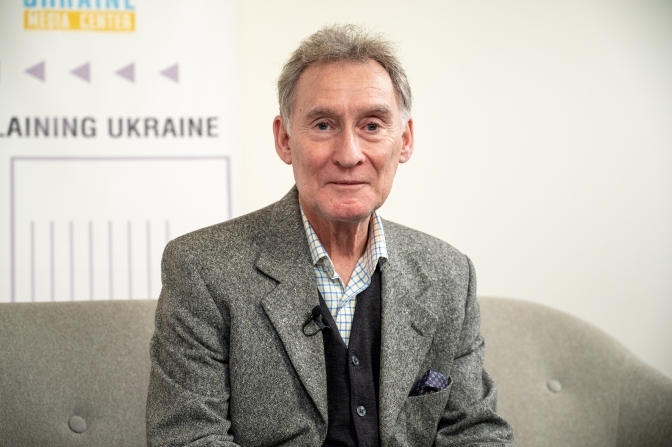
Photo by Ivan Stanislavskyi/Tvoe Misto
Professor Ellery, why did you come to Ukraine?
What is going on in Ukraine at the moment is, I would say, not just of bilateral and regional significance. What's going on has a global, strategic significance. I think it's very clear that Russia has moved on. I used to describe Russia as a strategic Mephistopheles, drawing on a reference in Goethe's “Faust” to Mephistopheles being the spirit which always negates, “Der Geist der stets Verneint”. But it's more than a frustration, and I think, we've seen a fundamentally disturbing shift toward aggressive imperialism. Still, the history of the world is very clear about the imperative to counter an attitude of aggressive imperialism. So I would see what Ukraine is doing today with great resolution and resilience.
I was here in May very briefly, as a guest of [security expert] Ostap Kryvdyk, to get a first feel for what was going on. And what came through loud and clear was the resolution and resilience of Ukraine in the face of this aggression. I am pleased to see that there has been widespread support for this position from around the world. As somebody coming from the UK, I'm delighted to think we're going to have a continuity of attitude and policy with respect to Ukraine. Our newly appointed Prime Minister has made it very clear that he will be in Kyiv very shortly. Secretary of State for Defense, Ben Wallace, who has a military background, is staying in post. And I think that's a very important signal both internally to the UK, but particularly to the people of Ukraine and beyond, to Russia.
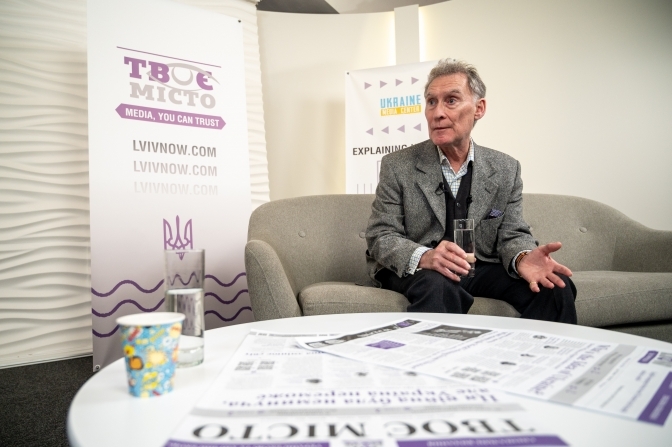
So, I am back here now. One of the reasons is that in mid-January of next year, I'm going to be directing an International symposium dealing with Ukraine. I'm delighted to say that his excellence Vadym Prystaiko, Ukraine's ambassador to the United Kingdom, with whom I had dinner last week in London, together with our chief of Defense Staff, Admiral Radakin, will be a key participant in that symposium. Jan Pieklo, with whom you're going to have an interview in a few minutes time - the standing expert, a former Polish ambassador to Kyiv, but a real expert in terms of Ukrainian and Russian affairs - will also be there. And it will be quite an international cast.
What is the aim?
The aim of that is not so much looking back. Yes, it's taking into account what is happening or what will be happening in mid-January. But critically, it will be looking forward. And when Ukraine comes through this and is the victor in this war - what does Ukraine look like, what might it look like in that post-conflict phase? What kind of thinking, ambition and aspirations might there be in both internal political and social structures, but also in terms of international engagement? There's an analogous to this - the discussion and the Strategic debate which went on in the UK in 1942. Then, Churchill recognized what we describe as the “turn of the tide” in the war. This was no coincidence that the U.S was committing significantly to that war, which was the product of a very detailed personal engagement between Churchill and President Roosevelt. But he recognized that the tide had turned, and he set about stimulating very deep detailed consideration of what the UK might look like when we had won. And so, [they] worked through the hard issues and what the options in relation to them might be. I heard some terrific discussion yesterday, [which I was] really encouraged to hear. Already, there are those of leading status within Ukraine who are turning their minds to this. And I really think it's important to have that parallel track of prosecuting, as effectively as you can, a military campaign to win the war. But in parallel - to be working through what those strategic policy issues are, once that conflict has been brought to a conclusion.
So, your point is that we have to spend as much energy on the issue of further development, post-conflict development, post-war recovery, as on the war issues?
There was always going to be a balance of priorities. In the first instance, you have to win the war, so there may be some tension there. But you're absolutely right. In parallel, there has to be significant detailed effort, rigorous effort in thinking and working through, and the identification and evaluation of those strategic options that must take place in parallel.
You learn and research a lot on leadership. In terms of that, what can you advise to the leadership that has to be in Ukraine, not only in terms of the military?
It's a crucial question, thank you! I think strategic leadership is characterized by individuals or a group. It can be a leadership, which is made up of several individuals having a very clear vision of the strategic direction of travel. So it wouldn't necessarily be just one, very fixed concrete objective. And I think, the times have passed with that.
I'm actually the co-author of a piece called “Adaptive Strategy”, which promotes a much more flexible elastic approach to this. The leadership comes where that vision is articulated in a clear compelling narrative, and that narrative is promulgated through a variety of channels. And that's, I think, the opportunity. But the challenge of today is that it's not just one or two channels through which you can communicate, but it is having a national conversation. It is not just top-down. The leadership is there to say: "We are in receipt of information and understanding, albeit imperfect, and incomplete. But on the basis of our understanding, we have arrived at the following conclusions. We now want to engage in debate and discussion at a national level to determine what would work for Ukraine and Ukraine's population."
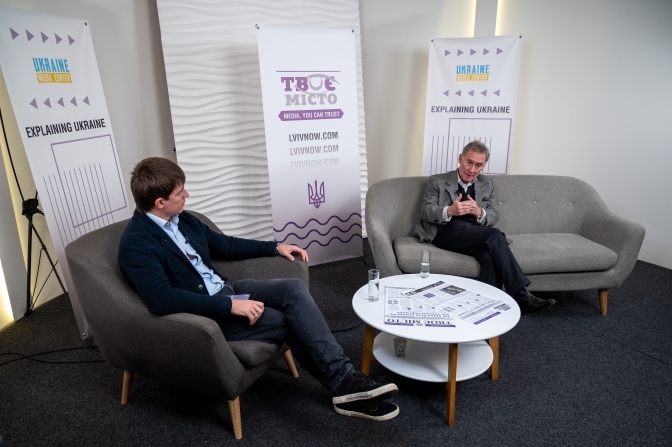
What do you see as an effective mechanism for that? Because during all these eight months after a full-scale Russian invasion, we feel a very strong vertical from top down. Many experts say that it's right in times of war. So, in military aspects, it is. But what you say is that about building the state, the country is a bit different. How do we manage to have it in synergy?
That's absolutely right. Turning back to the UK experience in the Second World War, and having a Chief of Staff Committee which was chaired by Phil Marshall (he was then General), and Alan Brooke, Churchill never ever overruled his senior military commanders on a topic of military importance. There was a delegated authority, but he was very very clear that as Prime Minister, he was accountable to Parliament, in liberal democracy, and through Parliament to the people. And every week, Churchill would make a statement to Parliament, and through Parliament to the people on the state of the war. And I think it's leadership having confidence, if you like, in their own ability to convey messages which might not always be easy ones to convey, both in terms of the nature and extent. They might be very difficult questions. We have similar questions being asked at the moment in the UK in terms of our economy. Difficult questions, you hear them all the time. But it's identifying those channels of communication. I'm sitting here today in this studio - this is one channel of communicating to a particular audience. There will be other audiences, there will be members of Ukraine's population who might not, unfortunately, tune in to this broadcast channel. But they will be looking to other sources of information, and it's up to that leadership to determine what the operative channels of communication and engagement are.
If we're talking about communication and different channels of communication… In terms of your experience, how strong, do you see, is a threat of disinformation and propaganda, and how is it shifting? Where do you see it shifting, and how do we cope with that effectively?
That's very tricky. I wish I had a nice neat answer to that but I don't think there is one. There was some research three or four years ago, I think it was MIT, which was able to establish that fake news spread six times faster than the truth. And that's very difficult to counter. What you can do is timing, this is where you're looking to influence the strategic context, the space in which you're going to be engaging with a population. So it is time and timing, and being very very clear as to what the message or set of messages you want to convey and get those messages out there.
There are two very striking characteristics of what's gone on and is going on in Ukraine at the moment. The first is, I think, that trade, finance and economics are not just being weaponized. They've actually now become a domain of warfare. And I think that's a very interesting shift. The other is the extent to which the West (if I can use that term loosely) made use of intelligence a number of months ago to shape a context of understanding for people. Having been in receipt of information which very equivalently pointed to a particular set of maneuvers by Russia, it actually put that out into the open space. And it pulled the rug from under Russia's feet because there was absolutely no surprise then. And so, it was out there, it was compelling. And I think the narrative that strategic leaders have to convey it's not just clarity and being compelling of itself. It has to be fashioned and delivered in such as to generate trust and confidence. And that combination, that axis of trust and confidence is fundamental to authority. And in a democracy, that authority from an electorate, from a population is crucial.
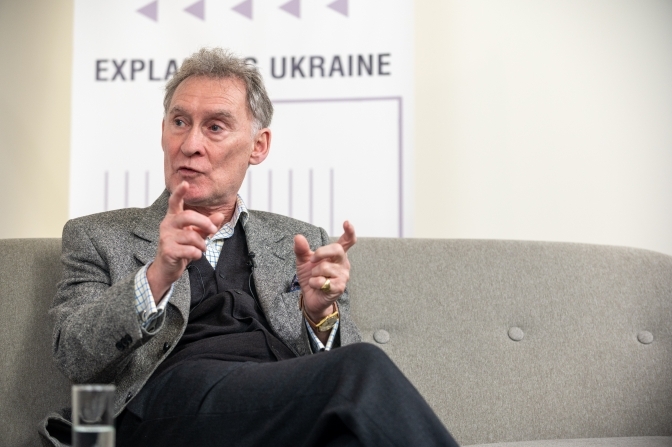
A very good example of that is the conversation held in Finland in December and early January of this year. I was in Helsinki in May and had very top-level talks, I can't say any more than that. And when I talked about the 24th of February, I was very clear at the level I was engaging that we didn't need to wait till the 24th of February. We knew there had been a shift on the 21st of December, when Putin made his speech, which basically said “we're not sure we’re going to recognize the boundaries, particularly in the Baltic area, which had been laid down following the break of the Soviet Union”. The strategic tectonic plates, as it was described to me, had shifted, and within a matter of hours, there was a shift in Finland's attitude towards Russia. A phrase that was used to me was the nature of the beast had finally become very apparent. There was then a national conversation within Finland. And whereas before that date, some 35 per cent of Finns were in favour of the application for NATO membership, within four weeks, that had been turned around to very nearly 75 in favour. And that was based on a very rigorous open national conversation. A fine demonstration. I would suggest that both strategic leadership and strategic communication [were there]. And the product of that conversation was consent on the part of the Finnish population, and then, flowing from that - permission to a government to pursue a radically different strategic security policy.
Who should be the key stakeholders in such a national conversation in Ukraine, from your perspective?
In Ukraine, it has to be the top. It really does have to go across the top echelon of government. There has to be coherence and consistency in the approach and in the articulation of what those imperatives are. But it must be honest, and there may well be some negative aspects to this. But we must face up to them, and in our view, these are the options for the best meeting of those challenges. But it isn't one person, it has to be a collective effort. As I say, one which is coherent but also consistent.
At the beginning of our conversation, you mentioned a few times about the resilience of Ukraine and the Ukrainians. Can you explain more what you see in Ukrainian resilience? Where do you see the biggest strengths?
I think it's what comes to us in the UK, and as I say, this is only my second visit. It was a short one in May, and I hope to be coming back reasonably regularly. It's a very strong sense of the Ukrainian population saying that we are going through a really tough time. In so many ways, people are dying, people are being really seriously injured. When I came in May, I saw the most horrific images of children having been horribly injured by Russian missiles. And there are very extensive child trauma within Ukrainian society, but it has not broken the spirit of Ukraine. And we see some of those images in our own media, we hear on the TV, online, and radio interviews with people who've gone through the most appalling experiences. But it's very clear to us that the spirit has not been broken. And if I may say so, Zelenskyi is doing a terrific job. I can honestly tell you that abroad, [he’s] being consistent and robust, and stands as an exemplar of what this resistance and resilience actually is. And what you're demonstrating, I think, is not just a military issue. It's not just a political issue, or a philosophical one. It's all of those things. It's actually a moral issue. And that goes to the heart of the matter. We do recognize that Ukraine sees this as existential. I mean this is not just about Russia. Occupying geography, occupying territory - it goes way more than that. And I think, we recognize that. And this is why there is a moral imperative not just to resist what Russia is doing or trying to do, but actually to overcome it.
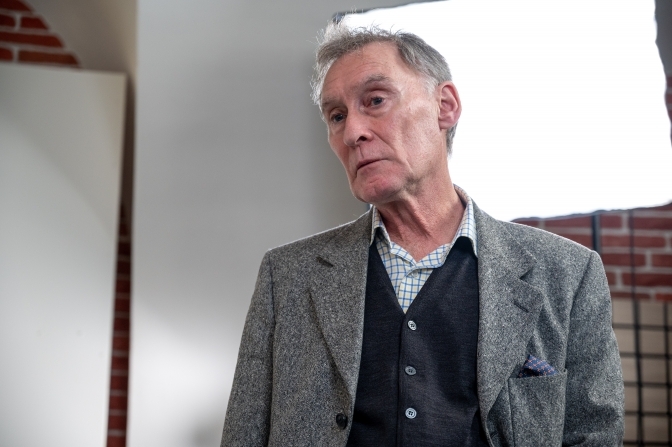
I will not ask you about when we will win, when the victory comes. But I would ask you when you mentioned, also in our conversation, about the new Prime Minister, that he will come. When do you think he will come here?
It will be very soon. I mean I don't know the detailed schedule. You will find it very soon. And I think it is a demonstration of that continuity of attitude. It's very important that we can have a collective position. Why? Because that position can act as an effect multiplier. So you can have individual nations, individual players who can bring it to an end, and have traction. In terms of an alliance and coalition, there is a multiplying effect. But we must recognize that an individual state, an individual can have a really important role to play. And I think the Prime Minister has recognized that it was a very important decision of his to keep Ben Wallace in his post as Secretary of State for Defense. Because he has been quite resolute. He's been very clear as to what the UK ought to be doing. And dare I say it, I'd like to think that that consistency and that robust approach by the UK would act as a lighthouse to other nations on the continent.
Taras Yatsenko spoke
Text by Vitalii Holich
Photos by Ivan Stanislavskyi/ Tvoe Misto
Follow us on Facebook and Instagram. Lviv Now is an English-language website for Lviv, Ukraine’s «tech-friendly cultural hub.» It is produced by Tvoe Misto («Your City») media-hub, which also hosts regular problem-solving public forums to benefit the city and its people.


